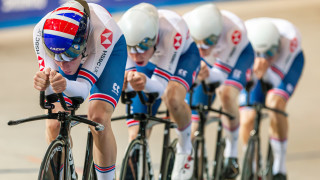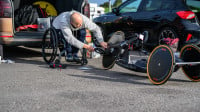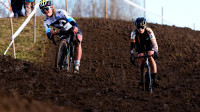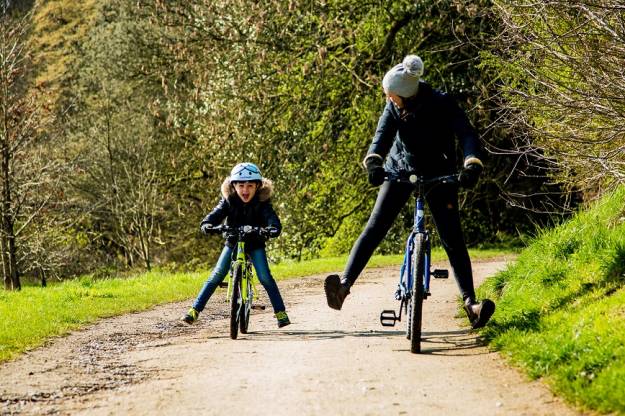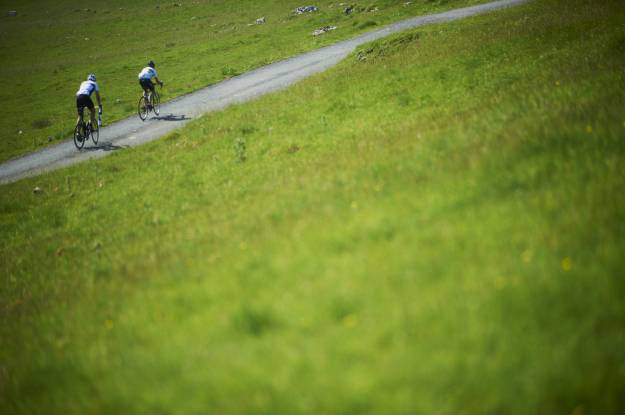Knowledge Level: Beginner
Sprint Events
Sprint
The sprint competition begins with a Flying 200 m qualification. This ranks the riders and seeds them for the head to head match ups.
The head to heads are contested over three laps. Track sprinting is not just a battle of power and speed but also of wit, intelligence and tactics. In the early part of the contest you can expect to see riders slowly circle the track in a game of 'cat and mouse', sometimes coming to a complete standstill, each trying to out-position their rival in order to launch a surprise dash for the line.
Keirin
Translating as “fight” from Japanese, where it’s a massive gambling sport, a modern Keirin might not quite be as no-holds barred as in the past but it’s still an explosive and extremely exciting event. Raced over eight laps, for the opening laps the riders must stay behind a small motorbike, known as a derny, which builds the speed from 30 kph to 50 kph for men and 25 kph to 40 kph for women. They can jostle for position behind the derny but mustn’t overtake it. With 3 laps to go, the derny leaves the track and, already up to an impressive speed, the sprint is on. Hitting finishing speeds of 70 kph, the riders manoeuvre for position and try to be the first across the line.
Endurance Events
Scratch
On the face of it, the scratch sounds simple. Riders race on the track for 15km (10km for women) and the first across the line wins. This may sound straightforward, but between the massed start and final sprint for the line, lies 60 laps where strategy and tactics will play a huge part in the outcome of the race.
Within the bunch will be riders whose strength lies in endurance and riders who favour sprinting. The endurance specialists will aim to ‘lap’ the field in order to prevent the powerful sprinters from saving themselves for the end of the race where they will undoubtedly outpace them in the dash for the line. The sprinters will try to save their energy until the very end of the race by sheltering in the bunch until a sprint finish but they must be careful not to let anyone take a lap or a sprint for the line will be irrelevant.
The blend of skills on show and tactics employed make the scratch one of the most exciting races to watch. There is lots of action as riders make attacks and either gain a lap or are chased down by the pack. It’s not enough just to lap the field though –riders need to make sure they have saved enough energy for the finish too.
Points Race
Aptly named, the aim of the points race is to score as many points as possible with the winning rider the one who has accumulated the most during the race. Points are scored during intermediate sprints which occur every ten laps. The first rider to cross the line at the end of a sprint lap is awarded five points with four, three and one points being awarded to the next three to cross the line. The big prize comes for gaining a lap on the field, which is worth 20 points - the equivalent of winning four sprints. Similarly, losing a lap will cost you 20 points.
Points races can be contested over distances varying from 10 km (40 laps) up to 40 km (160 laps) and will differ for men’s and women’s races. Expect to see tactics playing a big part in these races with alliances being formed and attacks being made. Riders need to race intelligently, as well as having stamina and sprinting power, to ensure they gain as many points as possible.

Individual pursuit
The ultimate head-to-head endurance event, the individual pursuit is the definitive test of staying power. There’s nowhere to hide and the challenge is to maintain a high speed over a long distance – no mean feat. Whilst an explosive start is helpful, the ability to ride at a consistently high speed is important – some riders may appear to be well up on their opponents, only to fade in the last kilometre.
The event is contested over 4km whilst the women pursue each other over 3km. The qualifying rounds will see each rider post a time with the fastest four progressing to the medal finals. In the finals the first rider to complete the distance wins, unless one rider catches the other, at which point the race is won and it’s game over.
Team Events
Team Sprint
If raw pace is your thing then the team sprint is the race for you. Teams of three men or two women race at exhilarating speeds over three or two laps of the track respectively. Two teams will race at the same time on the track from opposing sides. Each rider completes one lap at the front, sheltering their teammates and enabling them to conserve energy for their turn. Only one rider from the team must complete the race so each rider can hold nothing back on their turn.
Whilst sheer speed is vital, technique is also key in this event as riders must get off the line quickly from a standing start, get rapidly into a tight and efficient formation to maximise slipstreaming.
Team pursuit
The team pursuit is one of track cycling’s most iconic events and the aim is simple: pursue your opponents and catch them if you can.
Two teams of four riders take to the track on opposing sides. In closely fought battles teams will appear to maintain identical track positions with only hundredths of a second between them, whereas when one team is dominating you can see them visibly gaining on the other. The winning team is the one that crosses the line first (three riders must finish and the time is taken from the third rider’s front wheel crossing the line). If one team catches the other then the race is won there and then.
Stamina is pushed to the limit as the riders maintain top speeds over the gruelling 4km race. Together they must maximise efficiency, taking it in turns to ride at the front. After their turn, the front rider will swing up the track and re-join the line at the back. This must be perfectly timed as riders keep only centimetres apart and any error of judgment can be disastrous.



